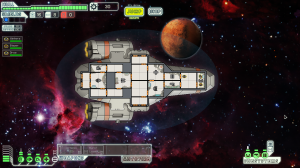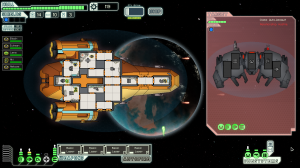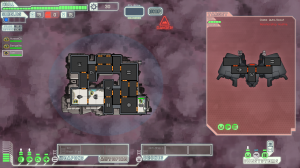After barely escaping from the rebel cruiser alive, the crew of the intrepid CrateBox realize their vessel is in dire need of repair. Unfortunately a slaver ship beams in and demands a crew member as tribute. Despite the consequences, the captain refuses to comply and instead opens fire in a brave last stand. But the slavers are equipped with hull breaching missiles, which can easily bypass the poor CrateBox’s shields. With a few quick commands, the captain reroutes the power of the shields to the stealth drive and activates it in the nick of time. Using the brief ten second window, two crew members quickly patch up the weapon systems and bring it online, firing six quick blasts to hopefully  knock out the enemy targeting systems. A direct hit. The enemy weapon room is now in flames, and this gives the crew of the CrateBox enough time to fire a second volley, targeting the life support, med bay and cockpit. With too many damaged systems, the slavers beg for their lives by offering a freed slave as a new crew member. With another hand on deck, the CrateBox jets off to a distress signal off in the distance, always aware of the rebel fleet that threatens to overtake them.
knock out the enemy targeting systems. A direct hit. The enemy weapon room is now in flames, and this gives the crew of the CrateBox enough time to fire a second volley, targeting the life support, med bay and cockpit. With too many damaged systems, the slavers beg for their lives by offering a freed slave as a new crew member. With another hand on deck, the CrateBox jets off to a distress signal off in the distance, always aware of the rebel fleet that threatens to overtake them.
That may sound like your average Star Trek episode, but it’s also just a tiny slice of the newly released FTL: Faster Than Light. Most space games tend to put you in the role of a daring space ace, dogfighting your way to victory, or in the position of overarching commander, sending orders and waging war on the interstellar level. But nobody hopped into a space fighter in Firefly, and the supreme command was generally out of sight on Star Trek, but those shows still managed to be exciting every week. FTL breaks the mold by echoing those shows and putting you in command of your own capital ship. You are the one who tells the engineer to reroute all power to shields, you’re the one who opens the airlock to prevent the electrical fire from spreading and you’re the one who sends the crew of redshirts over to sabotage the enemy weapon systems. It seems so obvious, but FTL is one of the first games to do this, making it one of the most genuinely unique and fun experiences out there.
FTL is essentially a mini strategy game where the entire journey ends in less than ninety minutes, but it’s designed to keep you playing again and again. The game begins by explaining that you’re a member of the Federation and you have  sensitive data about the enemy Rebel fleet. With said fleet in hot pursuit, you must traverse eight sectors of space via an array of jump beacons, while after each jump a semi-randomized event occurs. Sometimes these events can be sorted out by decision making or certain bits of equipment, but often it will come down to combat. Using a top down blueprint of your ship’s layout and liberal use of a pause button, you boss around the crew and attempt keep your star shuttle in top form while whittling down the shields and hull of the enemy. While most of the game does come down to combat, the wide variety of sectors, unique races, myriad ship designs and versatile tactical options keep things engaging.
sensitive data about the enemy Rebel fleet. With said fleet in hot pursuit, you must traverse eight sectors of space via an array of jump beacons, while after each jump a semi-randomized event occurs. Sometimes these events can be sorted out by decision making or certain bits of equipment, but often it will come down to combat. Using a top down blueprint of your ship’s layout and liberal use of a pause button, you boss around the crew and attempt keep your star shuttle in top form while whittling down the shields and hull of the enemy. While most of the game does come down to combat, the wide variety of sectors, unique races, myriad ship designs and versatile tactical options keep things engaging.
While the roguelike label isn’t entirely accurate, the game shares many elements with the seminal genre. Death is permanent and there’s no reloading, although you can quit a game and resume it later. It also plays to the loot based design by making each encounter drop new weapons, upgrade material or sometimes crew members. The game goes until you accomplish your mission or die in the process, and after receiving a score for the leaderboards you are sent right back to the hanger to reroll and go on a brand new adventure. But to make repeat space quests even more appealing, accomplishing secret in game tasks unlocks new ships to experiment with. Want a weaponless cruiser staffed almost entirely by robots? A ship full of preying mantises and a handy ship to ship teleporter? A stealth cruiser with no shields and serious firepower? And if that’s not enough, each ship has three unique achievements and a special alternate loadout that tweaks the strategy aspect even more.
It’s such a wonderful, simple game that you can pick up and play for an hour. It never oversteps or overreaches but instead concentrates on polish. The graphics are all simple, but it’s good looking 2D line art that perfectly compliments the gameplay. As for audio, the soundtrack is unassuming but adorably catchy and perfectly suited to space adventuring.  What really makes FTL shine is the underlying ability to play and replay the game from all sorts of different angles, trying out new things and encountering unexpected adventures each time. There’s a surprising amount of hidden features, unique encounters and bonus content in FTL, and it would be a shame to miss it. Most of all, the innovative gameplay hook makes for a game that’s just pure fun.
What really makes FTL shine is the underlying ability to play and replay the game from all sorts of different angles, trying out new things and encountering unexpected adventures each time. There’s a surprising amount of hidden features, unique encounters and bonus content in FTL, and it would be a shame to miss it. Most of all, the innovative gameplay hook makes for a game that’s just pure fun.
Final Verdict: If you have even a passing interest in sci-fi and you like either simple strategy games or casual roguelikes a la Binding of Isaac, FTL: Faster Than Light is an absolute must. When you consider the price, it’s a steal. It’s a simple game that will easily consume hour long chunks out of your day, with a premise that feels totally unique and fresh.
Rating: 









This review is based on a review copy of the GOG PC version of FTL: Faster Than Light provided by Subset Games.
Special thanks to GOG.com for providing the review copy. You can buy FTL: Faster Than Light DRM free and with bonus goodies at GOG.com.


